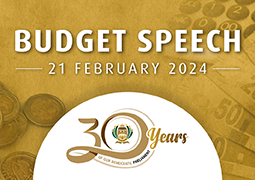
During the 2024 Budget Speech, delivered in Cape Town’s City Hall on Wednesday, the Minister of Finance, Mr Enoch Godongwana, announced that the government is now able to ease some of the fiscal consolidation that had been a feature of the 2023 Medium-Term Budget Policy Statement, which had announced a series of measures to protect South Africa’s fiscal integrity after revenue collection was worse than anticipated.
As part of the fiscal easing in 2024, Mr Godongwana announced that the education sector would be allocated an additional R25.7 billion for the carry-through costs of a wage increase over the medium term. “At the same time, we were able to protect the budgets of critical programmes such as the school nutrition programme. The programme provides food to pupils in almost 20 000 schools,” he said. In addition, he announced that the early childhood development grant would be allocated R1.6 billion, rising to R2 billion over the medium term.
Health, meanwhile, was allocated a total of R848 billion over the medium term. These allocations include R11.6 billion to address the 2023 wage agreement, R27.3 billion for infrastructure, and R1.4 billion for the NHI grant over the same period. The allocation for the NHI is a demonstration of the government’s commitment to this policy.
A range of system-strengthening activities remain to be completed, that are key enablers of an improved public health care system. These are:
Building a national health information system and digital patient records;
Upgrading health facilities and improving quality of care to ensure that they meet the minimum criteria to be certified and accredited for contracting under NHI;
Strengthening facility and district management in preparation for contracting;
Granting semi-autonomous status for central (and potentially other) hospitals; and
Developing reference prices and provider payment methods for hospitals.
Many of these activities are already underway but require further development before the NHI can be rolled out at scale.
To ensure the effective discharge of its duties during elections, and its other responsibilities beyond the polls, the Independent Electoral Commission was allocated an additional R2.3 billion. The police and defence were also allocated an additional R350 million to support elections. A further R200 million will be allocated for political party funding as political parties prepare for the general elections.
Government also supports resettled farmers through land redistribution and tenure reform programmes, which were allocated R6 billion over the medium term.
To keep pace with inflation and increase access, permanent social grants were increased.
• An increase of R100 to the old age, war veterans, disability and care dependency grants. This amount will be divided into R90 effective from April, and R10 effective October;
• A R50 increase to the foster care grant; and
• A R20 increase to the child support grant.
Work is currently underway to improve the Covid-19 Social Relief of Distress Grant by April this year. National Treasury will work with the Department of Social Development in ensuring that improvements in this grant are captured in the final regulations. These improvements will be within the current fiscal framework. For the extension of the grant beyond March 2025, the social security policy reforms, together with the funding source, will be finalised.
This budget is also prioritising infrastructure provision. Government plans to invest more than R943 billion in public infrastructure. The spending will support the refurbishment and maintenance of existing assets and the building of new infrastructure.
Mava Lukani
22 February 2024

